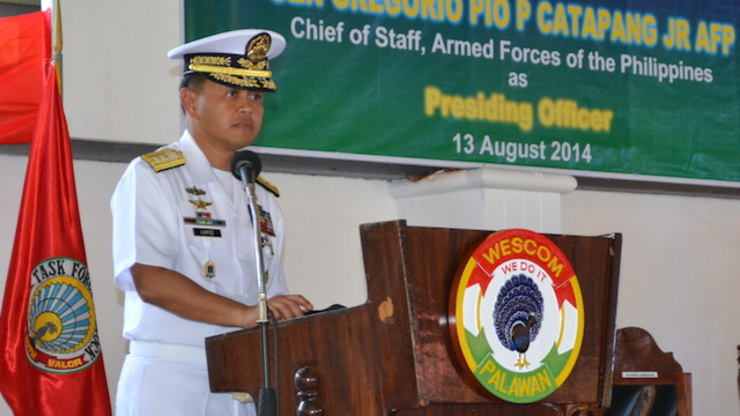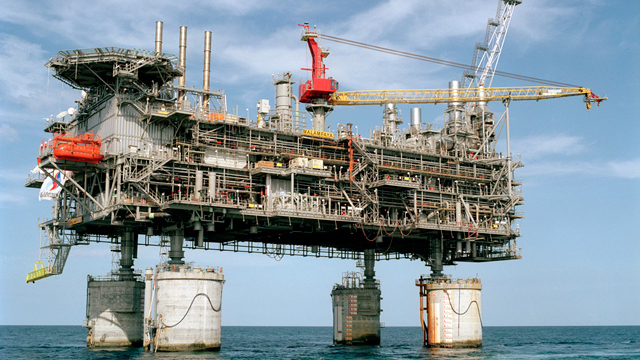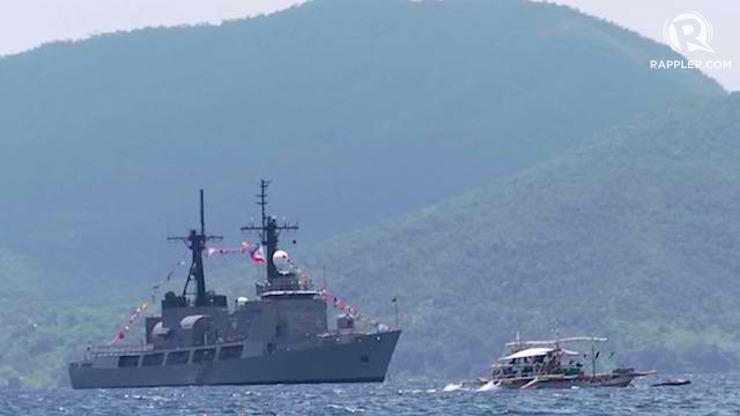The military recognizes Wescom's complicated balancing act of defending the country's claims without escalating the tension in the disputed waters

NEW WESCOM CHIEF: Rear Admiral Alexander Lopez. Wescom photo
A combative Navy
Rear Admiral Alexander Lopez began his watch of the West Philippine Sea (South
China Sea) this week as the country struggles to get the region’s support in
curbing China
Undeterred by the
shortage in the necessary capabilities, the new Western Command (Wescom) chief
boasted of the troops’ commitment to guard the country’s claims.
“Marahil,
maliwanag pa sa sikat ng araw ang nagbabantang pagkamkam at pati na pagyurak ng
ating yamang-dagat sa kanlurang bahagi ng ating bayan (The threat of
occupation and even the desecration of our maritime resources in the western
part of our country is as clear as sunshine),” Lopez said in his speech at the
change of command ceremony at Wescom headquarters in Palawan on Wednesday,
August 13.
Lopez didn’t
mention China
“May kaliitan
man ang ating Sandatahang Lakas kumpara sa ating mga kalapit-bansa, makakaasa
naman po kayo na buo at matibay ang aming loob sa pagbabantay at pagpapaigting
ng seguridad ng ating bayan (Our Armed Forces may be a small compared to
our neighbors’ but you can expect our wholehearted and strong commitment to
guard and intensify the security of our country),” Lopez added.
At the 47th ASEAN
Foreign Ministers' Meeting in Myanmar
last week, the Philippines
proposed a moratorium on provocative activities in the South
China Sea . In a joint communiqué, the foreign ministers said they
“remained seriously concerned over recent developments which had increased
tensions in the South China Sea .”
Careful
balancing game
Wescom is in
charge of Palawan and the West Philippine Sea, including Scarborough Shoal off
the cost of Zambales province in Luzon
following adjustments to the command's coverage last year.
The military
recognizes it is a complicated balancing act of defending the country's claims
without escalating the tension in the disputed waters.
"The future
of Philippine sovereignty lies in the hand of this command. Indeed, of all the
units in the Armed Forces, it is the Western Command that is entrusted to be in
the frontline of protecting our country's sovereignty," said Armed Forces
chief General Gregorio Catapang Jr.
It's a
"gargantuan task," Catapang said. "It is not easy to guard our
territories in the highly-disputed West Philippine Sea ,
we all know that the sea is a very fragile flashpoint. One wrong move and the
situation can escalate into a crisis," he added.
Navy takes the
helm

Malampaya gas field. Photo from Sembcorp Marine www.sembcorpmarine.com.sg
The post was not supposed to be for Lopez. His classmate in the Philippine Military Academy (PMA) Class of 1982, Air Force Major General Nicanor Vivar, was supposed to get Westcom. But last minute changes brought Lopez back to
It's a sort of a
homecoming for the decorated soldier, who previously served as commander of
Joint Task Force Malampaya. It is also one of Wescom's critical tasks to guard
the gas field located off Palawan that supplies power plants that provide 40%
of the electricity needs of Luzon .
(The Malampaya
gas field is said to have 2.7-trillion cubic feet of reserves but only an
estimated 1.2-trillion cubic feet has been used.)
Lopez would
become commander of the Fleet-Marine Ready Force and then deputy chief of staff
for Education and Training (J8) before his appointment as Wescom chief.
Lopez finished in
2000 a course on Naval Staff College
at the Naval War
College in Rhode Island Australia
Focus on Ulugan Bay
Catapang said
it's time to put a Navy officer in Westcom.
"The work is
here is more for the Navy – naval projection. We need to protect our national
interest, including the Malampaya gas field. He came from here, after all. You
don't have to train somebody else. The learning curve in the Armed Forces can
be difficult if you're not familiar with the work. Admiral Lopez already knows
what to do," Catapang said.
The naval station
in Palawan's Ulugan Bay , a strategic body of water that faces the West Philippine Sea , is seeing a lot of developments because
of the military's shift from internal security to territorial defense. (READ: State of PH Navy modernization: 'Golden Days will return')

Wescom's Naval Forces West (Navforwest) was relocated in 2013 to a barangay facing
The naval outpost
in Oyster Bay, a bay on the mouth of Ulugan
Bay Philippines
wants the US
These developments
created new problems, however. Residents around Ulugan Bay
Lopez vowed that
the local government units and other stakeholders will be constantly consulted
to come up with "pragmatic and sustainable approaches."
Wescom is also
dealing with the communist insurgency although their numbers have supposedly
diminished.
In the tradition
of the Navy, Lopez wished his predecessor fair winds, clear skies, and flowing
seas as he leaves the military service. And then he bowed down and ended his
speech with a prayer. His watch begins.
http://www.rappler.com/nation/66112-western-command-alexander-lopez

No comments:
Post a Comment
Note: Only a member of this blog may post a comment.